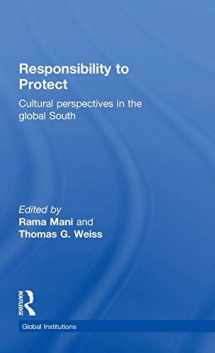
Responsibility to Protect: Cultural Perspectives in the Global South (Global Institutions)
ISBN-13:
9780415781848
ISBN-10:
0415781841
Author:
Thomas G. Weiss, Rama Mani
Publication date:
2011
Publisher:
Routledge
Format:
Hardcover
288 pages
FREE US shipping
Book details
ISBN-13:
9780415781848
ISBN-10:
0415781841
Author:
Thomas G. Weiss, Rama Mani
Publication date:
2011
Publisher:
Routledge
Format:
Hardcover
288 pages
Summary
Responsibility to Protect: Cultural Perspectives in the Global South (Global Institutions) (ISBN-13: 9780415781848 and ISBN-10: 0415781841), written by authors
Thomas G. Weiss, Rama Mani, was published by Routledge in 2011.
With an overall rating of 4.1 stars, it's a notable title among other
books. You can easily purchase or rent Responsibility to Protect: Cultural Perspectives in the Global South (Global Institutions) (Hardcover) from BooksRun,
along with many other new and used
books
and textbooks.
And, if you're looking to sell your copy, our current buyback offer is $0.3.
Description
This volume explores in a novel and challenging way the emerging norm of the Responsibility to Protect (R2P), initially adopted by the United Nations World Summit in 2005 following significant debate throughout the preceding decade. This work seeks to uncover whether this norm and its founding values have resonance and grounding within diverse cultures and within the experiences of societies that have directly been torn apart by mass atrocity crimes. The contributors to this collection analyze the responsibility to protect through multiple disciplines―philosophy, religion and spirituality, anthropology, and aesthetics in addition to international relations and law―to explore what light alternative perspectives outside of political science and international relations shed upon this emerging norm. In each case, the disciplinary analysis emanates from the global South and from scholars located within countries that experienced violent political upheaval. Hence, they draw upon not only theory but also the first-hand experience with conscience-shocking crimes. Their retrospective and prospective analyses could and should help shape the future implementation of R2P in accordance with insights from vastly different contexts. Offering a cutting edge contribution to thinking in the area, this is essential reading for all those with an interest in humanitarian intervention, peace and conflict studies, critical security studies and peacebuilding.


We would LOVE it if you could help us and other readers by reviewing the book
Book review

Congratulations! We have received your book review.
{user}
{createdAt}
by {truncated_author}


